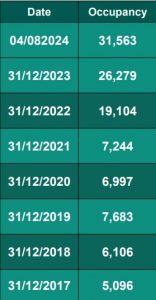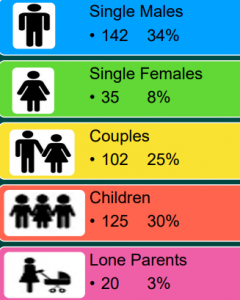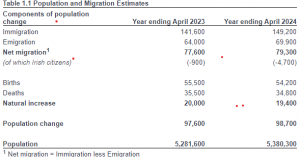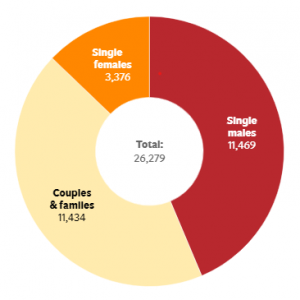I was in something of a dilemma when choosing a title for this essay. I could either go for the mundane Miller headline or, How to Boil A Frog, which is far more interesting but requires an explanation to ward off rent-a-protest animal rights activists. As you can see the Miller heading won but the Boiled Frog heading, used as a metaphor, may be closer to where I want to go.
So, who is Harry Miller? We met him briefly in my essay on The Hate Crime and Public Order (Scotland) Act 2021 where he was instrumental in changing the guidelines laid down by The College of Policing in 2021, relating to Non Crime Hate Incidents (NCHI). He was a gender realist who believed that biology triumphs over ideology and suffered some 1200 abusive mails, from a trans colleague, for his pains. His accuser, Lynsay Watson, was eventually fired from Leicestershire Police as a result but continued the pursuit of gender realists, including the alleged complainant against Graham Linehan. (Free Speech Watson is also alleged to be the instigator of the more recent complaint, to the Leicestershire Police, over Harry Millers comments celebrating Watsons dismissal.

Our hero, Harry, was interviewed under caution, for offences under the Online Safety Act. The first difficulty for the police was that the Act did not become enforceable until one day after the claimed offense. In my opinion, the second reason Harry was released was because the Police realised they had no proof of intent that would satisfy the definitions of an offense under the Act. However, it didn’t end there. Harry, who set up the Fair Cop campaign to take politics out of policing, requested details of how the police recorded the interview. He was shocked to receive a reply to his request, stating that he had a NCHI record with the following commentary: “The occurrence … in which you were interviewed in relation to on 20 November 2024 has been recorded as a hate crime. The crime (stalking involving serious alarm or distress) has prejudice flags attached.” Telegraph 16/12/25. I will give Harry’s response to the Telegraph, as follows:
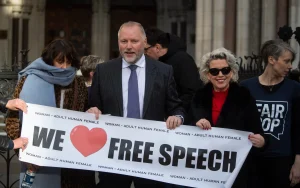
“This incident has revealed a whole new level of insanity. I was coerced into attending an interview under caution by Lincolnshire CID under threat of arrest, and questioned about breaking a law that did not exist.”
“Additionally, without charge, caution, referral to the CPS, or bothering to tell me, the police then gave me a criminal record for the imprisonable offence of stalking, adding for good measure the additional element of hate. Imagine that coming up in an enhanced DBS check.”
“Lincolnshire Police are criminally negligent. Every officer involved in this case needs bringing before a disciplinary tribunal, and the Chief Constable must personally apologise. It won’t stop me suing them, but it will be a start.” Telegraph 16/12/25
Harry has brought civil proceedings against the Home Secretary and sought a Judicial Review of the whole NCHI system
We will leave our hero for a moment and develop the rationale behind the alternative, Boiling Frog, headline. To do this we need to visit the august office of the Women and Equalities Secretary of State, Bridget Phillipson. Ms Phillipson has decided that the recent decision of the Supreme Court concerning the Equality Act, was “trans-exclusive”, and in error. She has been ‘slow walking’ publishing the guidelines recommended by the Equality and Human Rights Commission on the implementation of the Court’s decision. Her action is unconstitutional and factually incorrect and displays a common misunderstanding of her constitutional powers as a Secretary of State. As Suella Braverman says, in her article in the Telegraph, of Phillipson’s abuse of power:
“What Phillipson is doing amounts to an ideological attempt to rewrite the law. Eight months on from the ruling, the guidance should have been published. Instead, women are left in limbo, and public bodies are once again encouraged to guess, caveat and appease.” The Telegraph 21/12/25
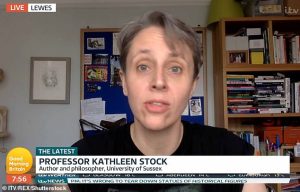
We can see why Bridget Phillipson is reluctant to implement the Supreme Court’s decision as one of Labours biggest contributors consider the law as “dangerous”. ‘ Daniel Kebede, the National Education Union (NEU) general secretary, warned: “A toxic climate has been created in recent years in which trans people, a small community, are treated as if they are a risk or threat to others.” Telegraph 04/12/25. I would just comment that, in my opinion, any toxicity Mr Kebede has seen is almost entirely due to his and his fellow travellers, aggressive promotion of trans and progressive dogma. We need only to look at the organisations who train the teaching profession to see where this dogma is caught because it is a kind of progressive social contagion. The main catalyst in the spread of anti free speech social contagion has been the Universities. Those who are brave enough to stand up to these bullies are shouted down, ostracised, threatened with violence and sometimes loss of a job, as in the case of Kathleen Stock. In short, Kathleen Stock was forced out of her position as an expert in analytic philosophy, from the University of Sussex. The Office for Students (OfS) found that the Universities Transgender Policy had a chilling affect on free speech and academic freedom and was fined £585k as a result. The University is appealing the fine on the basis that if the fine is upheld, Universities will be unable to restrict free speech and academic freedom, unless it is unlawful.(The Telegraph, 24/06/25) If we untangle their position, it appears that they want to retain the right to stifle ‘lawful’ free speech. An odd position for a University to take. Just to show that this isn’t an isolated example of anti free speech activity by the Universities, we have the case of Almut Gadow who taught law at the Open University. She was dismissed for questioning the inclusion of gender ideology to a course where gender was not relevant. As she said, “The law does not recognise a third gender, so why should I, a trained lawyer, recognise a third gender.” (The Telegraph, 24/06/25) The University settled for an undisclosed sum. Next we can follow the trail of infection to the schools where The Times reports embedded partisans have a plan to defy the law:
According to whistleblowing parents, governors and staff, a pro-trans rearguard action is under way, with activists in schools, local authorities, unions, sex-education groups, charities and other external bodies determined to ensure schools stay “gender affirming”, teaching children they can change sex. The Telegraph, 04/12/25.
We can move on to local counsels, who represent a hot bed of progressive nonsense, ably demonstrated by Bristol City Council’s Green Party trying to newspeak its constituents into using non gendered speech. They describe woman as, “chest feeding”, “people with ovaries” and instead of ‘maternity’ substituting it with ‘Paternity’. (Free Speech) As I said in the Free Speech article, the last bit defies even the Green Parties excuse for logic! We cannot exclude the Judiciary from this madness and the Sandie Peggie case illustrates that their Worships can also compete in the race for the progressives 2025 Idiots of the Year trophy. Judge Alexander Kemp ruled that Sandie Peggie has been harassed by the NHS by allowing a trans Doctor to use the female toilets. However, he found against her claim of discrimination and victimisation and ruled that, “it was “not inherently unlawful” for a biological man to use women’s changing rooms.” The Telegraph, 23/12/25 Obviously, that is not the end of the story. Not only is the verdict to be challenged in the light of the Supreme Court ruling, which he described as contentious, but also to the fabricated refences to other cases he used to support his judgement.
All the above examples of progressive lunacy have been randomly taken from newspaper articles over the last six months. You can make the case that they are mainly sourced from centre right papers but that doesn’t make them untrue. If anyone would like to give me a subscription to the Guardian I would gladly search through their pages for similar stories and I would expect to find some targeting looney conservatives. However, as the stories above illustrate, I would not have expected them to uncover the extent of the ideological capture of the establishment that my casual trawl caught. Also, the nature of the craziness is different. Right wing loonies tend to centre around personalities like Andrew Tate, MTG and Nick Fuentes. What we have seen above is far more organised, widespread and targeted on traditional values and institutions. The very word ‘woman’ is being censored by a Green Council, teachers subvert the law in schools, the police act to chill speech and we are told that a man can become a woman! How prescient of The New Statesman, of all papers, who in 2024 predicted that Labour will not have, ” a coordinated and comprehensive programme” and as a result, “…. its lack of a political compass leaves a government liable to return to identity politics.” (see below) It is not surprising that the New Statesman should be proved right in such a short time, as the number of U turns made by Starmer would induce dizziness in the best of us. The lack of any common sense policies that resonate with the public are legion and it is quite obvious that Starmer is becoming more a hostage of the progressive left the more he loses public support. The problem for Starmer is that the Left wing of his party also don’t have answers to the every day issues of most of the voters in the UK.
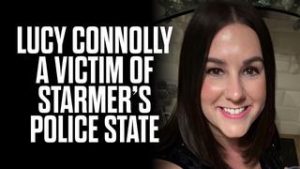
Here we reintroduce our boiled frog metaphor. At this point I have to confirm that no frogs were harmed in this discussion. For those who haven’t come across this before, the idea is that if you figuratively drop a frog in boiling water, it will smartly jump out of the pot. However, if you put the frog in warm water and gently apply heat it will be lulled into a false sense of security until it is too late. Translated to modern Britain, this means that a broad coalition of educated elites gradually promoted the interests of minority groups, based on their identity, against the greater indigenous population and its culture. Supercharged by radicalised colleges, apostles of progressivism spread their gospel via non profits and public bodies such as those mentioned in the Times article on schools. Initially, these foot soldiers infiltrated a wide spread of activist groups and causes promoting grievances and victimhood amongst their clients , on the basis of ethnicity, race, nationality, religion, denomination, gender, sexual orientation, social background, political affiliation, caste, age, education, disability, opinion, intelligence, and social class. Wikipedia. These widely disparate movements were not recognised as a movement at first until a pattern began to appear. Soon we saw the erection of victim hierarchies, newspeak, DEI, critical race theory, claims of systemic oppression, et al. As the heat turned up we began to see the ideological capture of previously respected organisations such as the BBC ( Auntie ) and the RNLI. (RNLI). Zealots, patrolled the airways, school corridors, social media and university classes, determined to prove systematic oppression. Those that were deemed to offend were hunted down with the same enthusiasm and religious fervour as the Spanish Inquisition employed. The Frog has now been boiled!

Well perhaps not yet. We have seen some retreat from EDI by companies. The Supreme Court has woken up and decreed what 95% of the population always knew. The BBC has been caught bending the truth in a very public and embarrassing way ( BBC ). Stonewall is facing falling revenues and for some reason is being kept afloat by the taxpayer. The Police have realised that using Hate Speech legislation to control speech has backfired. The science based Cass Report has scuppered any claim by the apostles of Trans to any medical or science basis to their policy of gender affirming treatment of children. People are getting more confident about challenging the abuses of the elites. They are beginning to see that there is no substance to the movement and they have nothing to offer but more idiotic policies, as foreseen by the New Statesman. The Green Party leader, Zack Polanski, hasn’t read the room on immigration and wants even more uncontrolled immigrants in statements that even the hard left fear to applaud. We are entertained by a succession of highly qualified people who crumble after being asked whether men can become pregnant. They stare at the cameras like rabbits in the headlights as they try to reconcile their ideology to reality. And that is their weakness and their strength. There is no attempt to ground their new religion to reality. There is no humility or attempt to serve the community only hatred, envy and resentment. And there we have the boiled frog theory, in practise.
“The Technetronic era involves the gradual appearance of a more CONTROLLED society. Such a society would be dominated by ELITES, unrestrained by traditional values.” ~ Zbigniew Brzezinski
Labour must beware the lure of progressivism 3rd. June 2024
Labour will struggle to decide its priorities. And its lack of a political compass leaves a government liable to return to identity politics. Stalled by intractable economic problems and unable to enact economic reform, it could slip back into the balm of progressivism. Embroiling itself in performative constitutional tinkering, the student politics of votes for 16-year-olds or the pseudo-science of transgender politics will quickly shatter its coalition. Taking up identity politics will risk Labour becoming a party of the HR department, enforcing bureaucratic social engineering around issues such as race and gender or imposing speech codes on the population because it knows best. Jonathan Rutherford, The New Statesman, https://www.newstatesman.com/politics/2024/06/labour-must-beware-the-siren-call-of-progressivism
Sources
Martin Evans, 16/12/25, The Telegraph, Gender-critical former police officer takes Mahmood to court, https://www.telegraph.co.uk/news/2025/12/16/gender-critical-former-police-officer-take-mahmood-to-court/
Daisy Eastlake, The Times, 12/12/25,
Zack Polanski: Allow small boat migrants in and let them work, https://www.thetimes.com/uk/politics/article/zack-polanski-interview-8653qhbn5
Ed Cumming, 24/06/25. The Telegraph, The academics cancelled at Britain’s ‘wokest’ campuses, https://www.telegraph.co.uk/news/2025/06/24/academics-muzzled-by-cancel-culture/
Julie Henry, 04/12/25, The Telegraph, The schools still supporting trans ideology behind parents’ backs, https://www.telegraph.co.uk/news/2025/12/04/schools-trans-ideology-children-parents/
Suella Braverman, 21/12/25, The Telegraph, Bridget Phillipson’s blocking of trans guidance is a shameful betrayal of women, https://www.telegraph.co.uk/news/2025/12/21/bridget-phillipsons-rewriting-of-law-is-a-betrayal-of-women/
Simon Johnson, 23/12/25, The Telegraph, Sandie Peggie ruling rewritten again after series of errors found, https://www.telegraph.co.uk/news/2025/12/23/sandie-peggie-tribunal-rewrite-errors-scotland-trans/



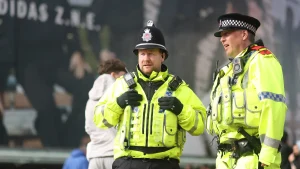





 how to administer medication in an emergency. A key element in this saga is that the Levines still don’t know what the offending communication was that triggered the arrest. The Times asked the school, the local council and police for information about the quantity of emails and for examples of what constituted malicious communications. All three declined to give details.(The Times, 29/03/25)
how to administer medication in an emergency. A key element in this saga is that the Levines still don’t know what the offending communication was that triggered the arrest. The Times asked the school, the local council and police for information about the quantity of emails and for examples of what constituted malicious communications. All three declined to give details.(The Times, 29/03/25)


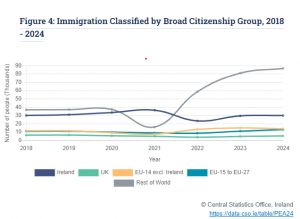 Whichever, figure you take it is an enormous strain on public services and local communities. For any journalist to produce any article on the impact of immigration, without putting the numbers in context is at best incompetent.
Whichever, figure you take it is an enormous strain on public services and local communities. For any journalist to produce any article on the impact of immigration, without putting the numbers in context is at best incompetent.

